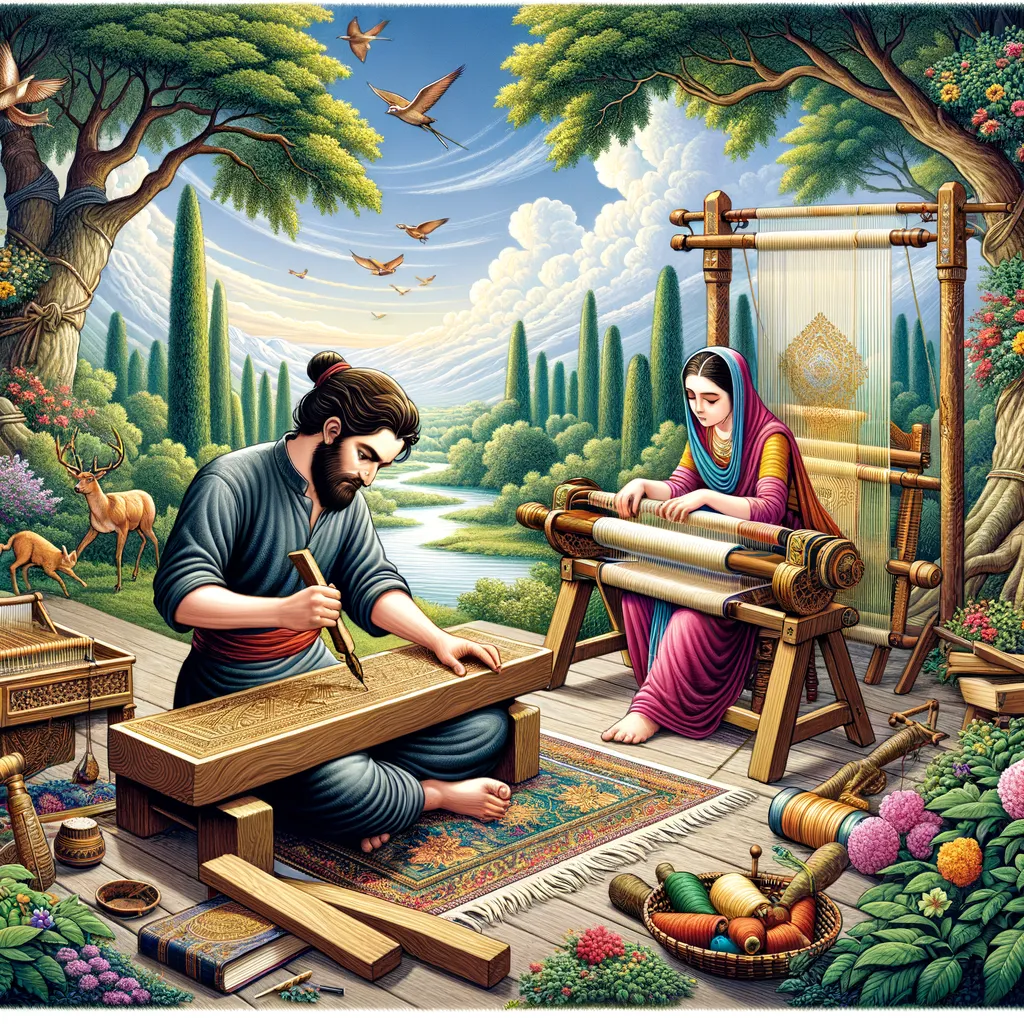Rediscovering Traditional Skills: From Woodworking to Weaving
In the fast-paced world we live in, it’s easy to lose touch with the hands-on skills and crafts that our ancestors used daily. Yet, there’s a growing movement of parents who are keen on reconnecting with these traditional skills and imparting the wisdom to their kids. From woodworking to weaving, there’s a whole world of activities that can not only bring families closer but also offer practical and creative outlets. In this guide, we will explore why and how to bring these traditional skills back into our lives, ensuring they are passed on to the next generation.
The beauty of learning skills like woodworking, knitting, or even gardening is that they offer more than just the final product. They teach patience, precision, and creativity. Moreover, they can be a source of relaxation and a way to disconnect from the digital world. In embracing these activities, families can enjoy quality time together, away from screens, fostering a deeper connection with each other and the environment. Interested in combining these skills with outdoor adventures? Check out the best Camping gear to complement your traditional skills journey or explore various Outdoor Activities that can enhance your experience.
Why Embrace Traditional Crafts?
The benefits of embracing traditional crafts extend far beyond the tangible items created. Engaging in these activities can improve mental health, reduce stress, and increase satisfaction. The process of creating something from scratch, with your own hands, provides a unique sense of accomplishment and pride. Additionally, mastering traditional skills can also lead to sustainable living practices. By creating goods at home, families can reduce their carbon footprint and promote a lifestyle that respects the environment.
How to Get Started
Beginning your journey in traditional skills doesn’t require a huge investment in materials or tools. Many crafts can be started with basic items that you might already have at home. Here’s a step-by-step guide to help you get started:
- Research: Start by researching which skills you and your family are interested in. Whether it’s woodworking, knitting, sewing, or pottery, there’s plenty of information available online and in local libraries.
- Invest in Quality Tools: While you don’t need to spend a fortune, investing in a few high-quality tools or materials can make the learning process more enjoyable and the final products more satisfying.
- Take a Class or Workshop: Many communities offer classes or workshops for beginners. This can be a great way to learn the basics and meet other people who share your interests.
- Practice: Like any skill, practice makes perfect. Don’t be discouraged by initial failures; they’re part of the learning process.
- Create a Dedicated Space: If possible, dedicate a space in your home for your new activities. Having a specific place to work can help keep you organized and motivated.
Rediscovering traditional skills can be an incredibly rewarding experience for the whole family. Not only do these activities provide practical, lifelong skills, but they also offer a way to bond and create lasting memories together. Embrace the challenge and enjoy the journey of learning something new together.
Rediscovering Traditional Skills: From Woodworking to Weaving: A Comprehensive Guide for Parents
Welcome to our in-depth exploration on how families can dive into the world of traditional skills, from the finesse of woodworking to the intricate patterns of weaving. Today’s lifestyle, heavily dependent on digital technology, often distances us from hands-on experiences that can enrich our lives in meaningful ways. However, a growing trend among parents aims to bridge this gap, seeking to instill in their children the value and joy found in traditional craftsmanship. In this guide, we will discuss why embracing these age-old skills is beneficial and provide practical steps on how to embark on this rewarding journey with your family.
Learning traditional skills such as woodworking, knitting, or pottery invites a plethora of benefits beyond the physical items created. These activities offer a retreat from the digital clutter, fostering patience, precision, and creativity. They serve as a medium for families to connect and spend quality time together, promoting a more sustainable and environmentally respectful lifestyle. For those looking to complement these skills with nature explorations, discovering the right Camping gear or various Outdoor Activities can enhance your traditional skills adventure.
Understanding the Value of Traditional Crafts
Embracing traditional crafts enriches our lives in several ways. These mindful activities can significantly improve mental health, reduce stress levels, and boost overall happiness. The act of creating with one’s hands brings a unique sense of satisfaction and pride, celebrating creativity and resourcefulness. Furthermore, engaging in these skills supports sustainable living by promoting homemade goods and reducing reliance on mass-produced items, thereby decreasing our environmental footprint.
Embarking on Your Traditional Skills Journey
Starting your adventure in traditional crafts is easier than you might think, and it doesn’t have to strain your budget. Here are crucial steps to kickstart your exploration into traditional skills:
- Research: Delve into the various skills that fascinate you and your family, utilizing online resources and local library collections to gather information.
- Invest in Quality Tools: Selecting a few quality tools or materials can greatly enhance the learning experience and result in more rewarding creations.
- Join a Class or Workshop: Beginner classes or workshops in your community can offer valuable instruction and a chance to connect with like-minded individuals.
- Practice Makes Perfect: Regular practice is essential for mastering any skill. Embrace the learning curve, knowing that each mistake is a step towards improvement.
- Set Up a Creative Space: If possible, designate a specific area in your home for your crafts, aiding in organization and ongoing motivation.
As you embark on this journey of discovering traditional skills, here are five essential things every parent should know:
- The Value of Patience: Learning and mastering traditional skills take time. It’s a process that teaches both you and your children the importance of patience and perseverance.
- Mistakes are Learning Opportunities: Every mishap is a chance to learn and grow. Encourage your children to see errors as part of the learning process, cultivating a resilient and innovative mindset.
- Customization Leads to Pride: Personalizing projects can significantly enhance your child’s interest and pride in their work, encouraging them to engage more deeply with the craft.
- Connections to Cultural Heritage: Many traditional skills have deep cultural roots. Exploring these can help children develop a greater appreciation for their own heritage and that of others.
- Sustainability Matters: Embedding the values of sustainability and respect for the environment through these activities can foster lifelong responsible habits.
Rediscovering traditional skills as a family is an enriching journey, packed with lessons in creativity, patience, and ecological responsibility. It offers a unique avenue for families to bond, create, and learn together, forging not just tangible items, but memories and values that last a lifetime. Whether it’s the calm precision of woodworking, the rhythmic movements of weaving, or the joyful mess of pottery, these activities bring immense satisfaction and a deepened connection to the world around us. Start small, stay committed, and watch as these ancient crafts bring new joy and understanding into your family’s life.
Bringing traditional skills and crafts into our modern lives not only teaches valuable hands-on abilities
Disclaimer
The articles available via our website provide general information only and we strongly urge readers to exercise caution and conduct their own thorough research and fact-checking. The information presented should not be taken as absolute truth, and, to the maximum extent permitted by law, we will not be held liable for any inaccuracies or errors in the content. It is essential for individuals to independently verify and validate the information before making any decisions or taking any actions based on the articles.




